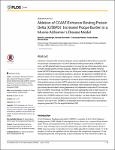Ablation of CCAAT/Enhancer-Binding Protein Delta (C/EBPD): Increased Plaque Burden in a Murine Alzheimer’s Disease Model
Lutzenberger, Manuel
Burwinkel, Michael
Riemer, Constanze
Bode, Victoria
Baier, Michael
Alzheimer’s disease (AD) and prion diseases carry a significant inflammatory component. The astrocytic overexpression of CCAAT/enhancer-binding protein delta (C/EBPD) in prion- and AD-affected brain tissue prompted us to study the role of this transcription factor in murine model systems of these diseases. Ablation of C/EBPD had neither in the AD model (APP/PS1double transgenic mice) nor in the prion model (scrapie-infected C57BL/6 mice) an influence on overt clinical symptoms. Moreover, the absence of C/EBPD did not affect the extent of the disease-related gliosis. However, C/EBPD-deficient APP/PS1 double transgenic mice displayed significantly increased amyloid beta (Abeta) plaque burdens while amyloid precursor protein (APP) expression and expression of genes involved in beta amyloid transport and turnover remained unchanged. Gene expression analysis in mixed glia cultures demonstrated a strong dependency of complement component C3 on the presence of C/EBPD. Accordingly, C3 mRNA levels were significantly lower in brain tissue of C/EBPD-deficient mice. Vice versa, C3 expression in U-373 MG cells increased upon transfection with a C/EBPD expression vector. Taken together, our data indicate that a C/EBPD-deficiency leads to increased Abeta plaque burden in AD model mice. Furthermore, as shown in vivo and in vitro, C/EBPD is an important driver of the expression of acute phase response genes like C3 in the amyloid-affected CNS.
No license information

